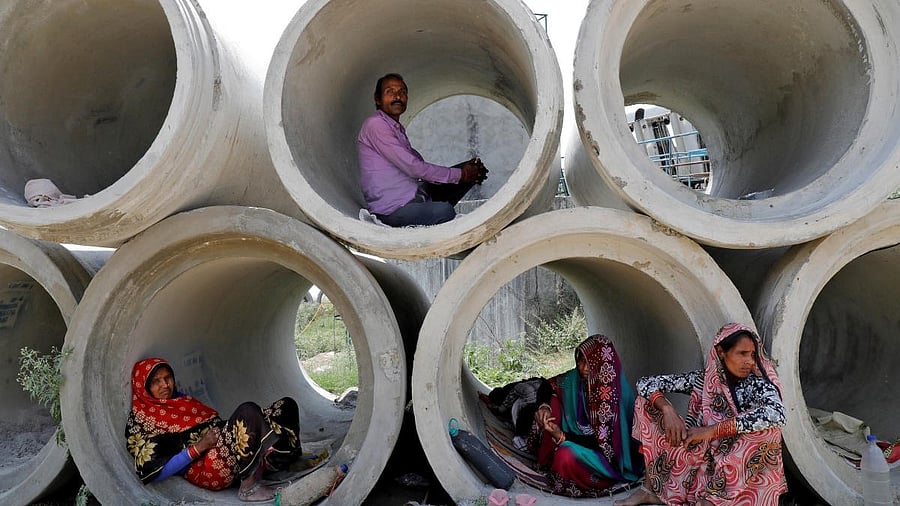
Representative image of labourers.
Credit: Reuters Photo
The Karnataka government’s proposed regulatory framework for domestic workers is a welcome step towards improving their working conditions. However, the Bill’s shortcomings are a reflection of the Labour Ministry’s inadequate consultation process – particularly without publishing a Kannada draft of the Bill – shutting workers out of any meaningful engagement on a law that could fundamentally transform their lives. In its current form, this law is more likely to inhibit rather than enable the dignity of the domestic workers.
First, the Karnataka Domestic Workers (Social Security and Welfare) Bill reflects a lack of understanding of the conditions that force people, particularly women and young girls, into domestic work – adverse life events such as death/ disability of /abandonment by primary breadwinners, medical emergencies, crop failures/ natural disasters, etc. In such a context, mandatory registration for domestic workers risks creating arbitrary and exclusionary barriers to their right to a livelihood.
Second, the process of registration involves an application along with government-prescribed fees and documents. Worse still, the Bill allows applications to be rejected without specifying the circumstances that warrant rejection, opening the door to unchecked discretion and abuse.
Aggravating the problem, the Bill mandates a written agreement between workers and employers – a very concerning provision given that many workers are unlettered. The Bill does not create any mechanism for workers to be assisted in making such agreements so that their interests are sufficiently protected. Moreover, non-compliance merely penalises the employers/service providers without offering any remedies for the domestic worker, especially where there is a breach of the agreement.
Such provisions create unnecessary compliance costs for both the workers and the employers, which is likely to discourage direct engagement and lead to a proliferation of “service providers” with the wherewithal to manage such costs. Further, the Bill, by placing the onus of registration on the employers/service providers, effectively empowers them to compel domestic workers to produce documents which may or may not be possible given the precarious circumstances that force some of them into domestic work.
It is also concerning that such provisions may encourage the commodification of domestic work into “insta-maid” services and usher in the era of technofeudalism in Karnataka.
Toothless enforcement
Third, besides the glaring silence on actual remedies, the Bill makes rights conferred illusory with the enforcement mechanism it establishes – a State Board and decentralised, district-level grievance redressal committees.
The Board is conferred with powers of inquiry into violations; its powers to remedy the same are limited to referring complaints to the police or the court. The district committees have a broad mandate to address the grievances of the domestic workers, employers, service-providers, placement agencies, and any other person involved in the employment or non-employment of the worker. The composition, terms of reference, and procedures to be followed are left to be defined by the executive’s rules.
Furthermore, the Bill specifically bars courts from taking cognisance of any offence under this law without either a complaint by or written sanction from the district or State Board or an office-bearer of a voluntary organisation registered under the Societies Registration Act, 1860 or the Trade Unions Act.
These provisions effectively reduce the legal personhood of the domestic workers as passive beneficiaries rather than rights holders with dignity. There is no reason why the State cannot imagine a law that enables domestic workers to approach a court or a board to enforce their rights and avail remedies for injuries, much like any other worker could. The practical difficulties that domestic workers might face on account of their economic limitations or lack of legal awareness could be addressed through other means of support.
Once a more robust framework for redressal committees is developed, it will be crucial to constitute these committees at the taluk level, rather than the district level, to truly facilitate access to workers.
Fourth, criminalising non-compliance as an offence is disproportionate. If punishment is aimed at fulfilling the command of the law, perhaps deterrence is better achieved through economic sanctions enforced as civil remedies than through criminal penalties. Moreover, studies have indicated that the certainty of being held accountable for the violation of laws is a more powerful deterrent than stringent punishments. However, without a meaningful enforcement mechanism or effective remedies, criminalising non-compliance is the easiest way to appear sincere.
Finally, the government of Karnataka must address these concerns before enacting the Bill. Most importantly, finalising the Bill without wide-ranging consultations with domestic workers across the state would be a disservice to the very persons whose interests it claims to protect.
(The writers are legal practitioners working with the Alternative Law Forum, Bengaluru)
Disclaimer: The views expressed above are the author's own. They do not necessarily reflect the views of DH.